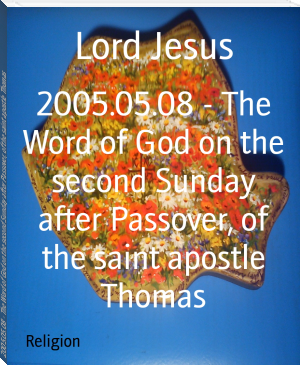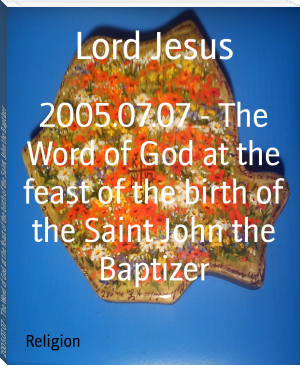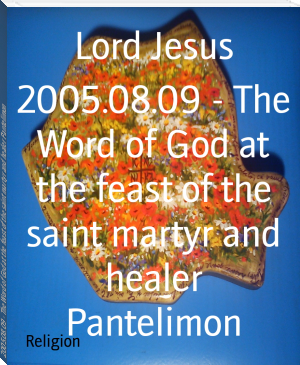The Story of a Soul, Saint Thérèse de Lisieux [android e book reader txt] 📗

- Author: Saint Thérèse de Lisieux
- Performer: -
Book online «The Story of a Soul, Saint Thérèse de Lisieux [android e book reader txt] 📗». Author Saint Thérèse de Lisieux
. . . . . . .
Disconsolate at the prospect of losing their treasure, the Community began a novena to Our Lady of Victories on June 5, 1897, in the fervent hope that she would once again miraculously raise the drooping Little Flower. But her answer was the same as that given by the blessed Martyr, Théophane Vénard, and they were forced to accept with generosity the bitterness of the coming separation.
At the beginning of July, her state became very serious, and she was at last removed to the Infirmary. Seeing her empty cell, and knowing she would never return to it, Mother Agnes of Jesus said to her: "When you are no longer with us, how sad I shall feel when I look at this cell!"
"For consolation, little Mother, you can think how happy I am up there, and remember that much of my happiness was acquired in that little cell; for," she added, raising her beautiful eyes to Heaven, "I have suffered so much there, and I should have been happy to die there."
As she entered the Infirmary she looked towards the miraculous statue of Our Lady, which had been brought thither. It would be impossible to describe that look. "What is it you see?" said her sister Marie, the witness of her miraculous cure as a child. And Thérèse answered: "Never has she seemed to me so beautiful . . . but to-day it is the statue, whereas that other day, as you well know, it was not the statue!" And from that time she often received similar consolations.
One evening she exclaimed: "Oh, how I love Our Blessed Lady! Had I been a Priest, how I would have sung her praises! She is spoken of as unapproachable, whereas she should be represented as easy of imitation. . . . She is more Mother than Queen. I have heard it said that her splendour eclipses that of all the Saints as the rising sun makes all the stars disappear. It sounds so strange. That a Mother should take away the glory of her children! I think quite the reverse. I believe that she will greatly increase the splendour of the elect . . . Our Mother Mary! Oh! how simple her life must have been!" and, continuing her discourse, she drew such a sweet and delightful picture of the Holy Family that all present were lost in admiration.
A very heavy cross awaited her before going to join her Spouse. From August 16 to September 30, the happy day of her death, she was unable to receive Holy Communion, because of her continual sickness. Few have hungered for the Bread of Angels like this seraph of earth. Again and again during that last winter of her life, after nights of intolerable pain, she rose at early morn to partake of the Manna of Heaven, and she thought no price too heavy to pay for the bliss of feeding upon God. Before depriving her altogether of this Heavenly Food, Our Lord often visited her on her bed of pain. Her Communion on July 16, the feast of Our Lady of Mount Carmel, was specially touching. During the previous night she composed some verses which were to be sung before Communion.
Thou know'st the baseness of my soul, O Lord, Yet fearest not to stoop and enter me. Come to my heart, O Sacrament adored! Come to my heart . . . it craveth but for Thee! And when Thou comest, straightway let me die Of very love for Thee; this boon impart! Oh, hearken Jesus, to my suppliant cry: Come to my heart!
In the morning, when the Holy Viaticum was carried to the Infirmary, the cloisters were thickly strewn with wild flowers and rose-petals. A young Priest, who was about to say his first Mass that day in the Chapel of the Carmel, bore the Blessed Sacrament to the dying Sister; and at her desire, Sister Mary of the Eucharist—whose voice was exceptionally sweet—sang the following couplet:
Sweet martyrdom! to die of love's keen fire:
The martyrdom of which my heart is fain!
Hasten, ye Cherubim, to tune your lyre;
I shall not linger long in exile's pain!
. . . . . . .
Fulfill my dream, O Jesus, since I sigh
Of love to die!
A few days later Thérèse grew worse, and on July 30 she received Extreme Unction. Radiant with delight the little Victim of Love said to us: "The door of my dark prison is ajar. I am steeped in joy, especially since our Father Superior has assured me that to-day my soul is like unto that of a little child after Baptism."
No doubt she thought she was quickly to join the white-robed band of the Holy Innocents. She little knew that two long months of martyrdom had still to run their course. "Dear Mother," she said, "I entreat you, give me leave to die. Let me offer my life for such and such an intention"—naming it to the Prioress. And when the permission was refused, she replied: "Well, I know that just at this moment Our Lord has such a longing for a tiny bunch of grapes—which no one will give Him—that He will perforce have to come and steal it. . . . I do not ask anything; this would be to stray from my path of self-surrender. I only beseech Our Lady to remind her Jesus of the title of Thief, which He takes to Himself in the Gospels, so that He may not forget to come and carry me away."
. . . . . . .
One day Soeur Thérèse took an ear of corn from a sheaf they had brought her. It was so laden with grain that it bent on its stalk, and after gazing upon it for some time she said to the Mother Prioress: "Mother, that ear of corn is the image of my soul. God has loaded it with graces for me and for many others. And it is my dearest wish ever to bend beneath the weight of God's gifts, acknowledging that all comes from Him."
She was right. Her soul was indeed laden with graces, and it was easy to discern the Spirit of God speaking His praises out of the mouth of that innocent child.
Had not this Spirit of Truth already dictated these words to the great Teresa of Avila:
"Let those souls who have reached to perfect union with God hold themselves in high esteem, with a humble and holy presumption. Let them keep unceasingly before their eyes the remembrance of the good things they have received, and beware of the thought that they are practising humility in not recognising the gifts of God. Is it not clear that the constant remembrance of gifts bestowed serves to increase the love of the giver? How can he who ignores the riches he possesses, spend them generously upon others?"
But the above was not the only occasion on which the "little Thérèse of Lisieux"[8] gave utterance to words that proved prophetic. In the month of April, 1895, while she was still in excellent health, she said in confidence to one of the older nuns: "I shall die soon. I do not say that it will be in a few months, but in two or three years at most; I know it because of what is taking place in my soul."
The novices betrayed surprise when she read their inmost thoughts. "This is my secret," she said to them: "I never reprimand you without first invoking Our Blessed Lady, and asking her to inspire me as to what will be most for your good, and I am often astonished myself at the things I teach you. At such times I feel that I make no mistake, and that it is Jesus Who speak by my lips."
During her illness one of her sisters had experienced some moments of acute distress, amounting almost to discouragement, at the thought of the inevitable parting. Immediately afterwards she went to the Infirmary, but was careful not to let any sign of grief be seen. What was her surprise when Thérèse, in a sad and serious tone, thus addressed her: "We ought not to weep like those who have no hope."
One of the Mothers, having come to visit her, did her a trifling service. "How happy I should be," thought the Mother, "if this Angel would only say: 'I will repay you in Heaven!' At that instant Soeur Thérèse, turning to her, said: "Mother, I will repay you in Heaven!"
But more surprising than all, was her consciousness of the mission for which Our Lord had destined her. The veil which hides the future seemed lifted, and more than once she revealed to us its secrets, in prophecies which have already been realised.
"I have never given the Good God aught but love; it is with Love
He will repay.
At another time she interrupted a Sister, who was speaking to her of the happiness of Heaven, by the sublime words: "It is not that which attracts me."
"And what attracts you?" asked the other. "Oh! it is Love! To love, to be beloved, and to return to earth to win love for our Love!"
One evening, she welcomed Mother Agnes of Jesus with an extraordinary expression of joy: "Mother!" she said, "some notes from a concert far away have just reached my ears, and have made me think that soon I shall be listening to the wondrous melodies of Paradise. The thought, however, gave me but a moment's joy—one hope alone makes my heart beat fast: the Love that I shall receive and the Love I shall be able to give!
"I feel that my mission is soon to begin—my mission to make others love God as I love Him . . . to each souls my little way . . .
I WILL SPEND MY HEAVEN IN DOING GOOD UPON EARTH.Nor is this impossible, since from the very heart of the Beatific Vision, the Angels keep watch over us. No, there can be no rest for me until the end of the world. But when the Angel shall have said: 'Time is no more!' then I shall rest, then I shall be able to rejoice, because the number of the elect will be complete."
"And what is this little way that you would teach to souls?"
"IT IS THE WAY OF SPIRITUAL CHILDHOOD, THE WAY OF TRUST AND ABSOLUTE SELF-SURRENDER.I want to point out to them the means that I have always found so perfectly successful, to tell them that there is but one thing to do here below: we must offer Jesus the flowers of little sacrifices and win Him by a caress. That is how I have won Him, and that is why I shall be made so welcome."
"Should I guide you wrongly by my little way of love," she said to a novice, "do not fear that I shall allow you to continue therein; I should soon come back to the earth, and tell you to take another road. If I do not return, then believe in the truth of these my words: We can never have too much confidence in the Good God, He is so mighty, so merciful. As





Comments (0)